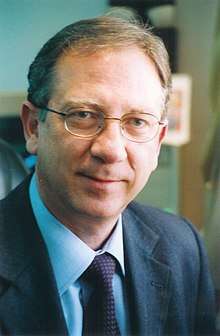Riad Ismat
Mohammad Riad Hussain Ismat (Arabic: رياض عصمت) (11 July 1947 – 13 May 2020)[1] was a Syrian writer, critic and theatre director. He served as Minister of Culture of Syria from 3 October 2010 to 23 June 2012.
Riad Ismat رياض عصمت | |
|---|---|
 Riad Ismat in 2009 | |
| Minister of Culture | |
| In office October 3rd, 2010 – June 23rd, 2012 | |
| President | Bashar al-Assad |
| Prime Minister | Muhammad Naji al-Otari Adel Safar |
| Preceded by | Riyad Naasan Agha |
| Succeeded by | Lubanah Mshaweh |
| Personal details | |
| Born | 11 July 1947 Damascus, Syria |
| Died | 13 May 2020 (aged 72) Glenview, Illinois, United States |
| Spouse(s) | Azzah Konbaz |
| Children | 3 |
| Residence | United States of America |
| Alma mater | Damascus University, University College, Cardiff |
| Profession | Dramatist, critic, director, diplomat |
Early life, education and career
Ismat studied English literature at the Damascus University and graduated in 1968.[1] In 2000, he became Rector of the Academy of Dramatic Arts,[2][3] after years of teaching. In 2003, Ismat became Director General of Syrian State Radio and Television, then held the post of Syrian Vice-Minister of Culture. In 2005, he was appointed Ambassador to Pakistan and in 2010, Syrian Ambassador to Qatar. In October 2010, Ismat was appointed as Minister of Culture,[4] serving in that post until 23 June 2012. From 2013 to 2014 he served as Buffett Center Visiting Scholar at Concordia University in River Forest, Illinois.[2]
Theatre
Ismat has directed more than 15 theatrical productions, including interpretations of Shakespeare, Tennessee Williams and Frank Wedekind, as well as producing his own personal vision of The Arabian Nights. He founded the first mime troupe in Damascus and taught mime, acting & directing at the Syrian Academy of Dramatic Arts. There he used to teach the Stanislavsky-based method of acting.[2] His breakthrough as a playwright came with The Game of Love & Revolution; among his best known dramatic works are: Was Dinner Good, dear Sister; Mourning Becomes Antigone; Sinbad; Shahryar's Nights; Abla & Antar; Mata Hari; The Banana Republic and In Search of Zenobia.[5] Ismat also directed his own television trilogy for Syrian TV, "The Artist & Love", 1985.
Publications
Ismat had published 35 books, including short stories and several books on Arab and World drama. He had also written a book on the Nobel Prize laureate Naguib Mahfouz and a book on cinema. As a television script writer, he had written the scripts for seven television serials.
Death
Ismat died on 13 May 2020 in Glenview, Illinois due to COVID-19.[1]
See also
- Cabinet of Syria
References
- "وفاة وزير الثقافة السوري الأسبق رياض عصمت بفيروس "كورونا"". enabbaladi.net (in Arabic). 14 May 2020.
- "An Interview with Riad Ismat on Art, Syria, & the Diaspora". Muftah.org. 7 February 2014.
- North Central College (10 February 2015). "Scholar-in-residence Riad Ismat discusses the arts and statesmanship".
- "Syria's Assad replaces two ministers". France 24. 3 October 2010. Retrieved 14 December 2010.
- "Former Culture Minister Riad Ismat Dies of Coronavirus in Us". The Syrian Observer. 15 May 2020.
External links
- Minister of Culture Mohammad Riad Hussain Ismat, SANA
- Biography of the new Syrian government 2011 - the names and lives of government ministers, Syria FM, 17 April 2011
- Ministry of Culture official government website
- Riad Ismat on IMDb
- Works by or about Riad Ismat in libraries (WorldCat catalog)